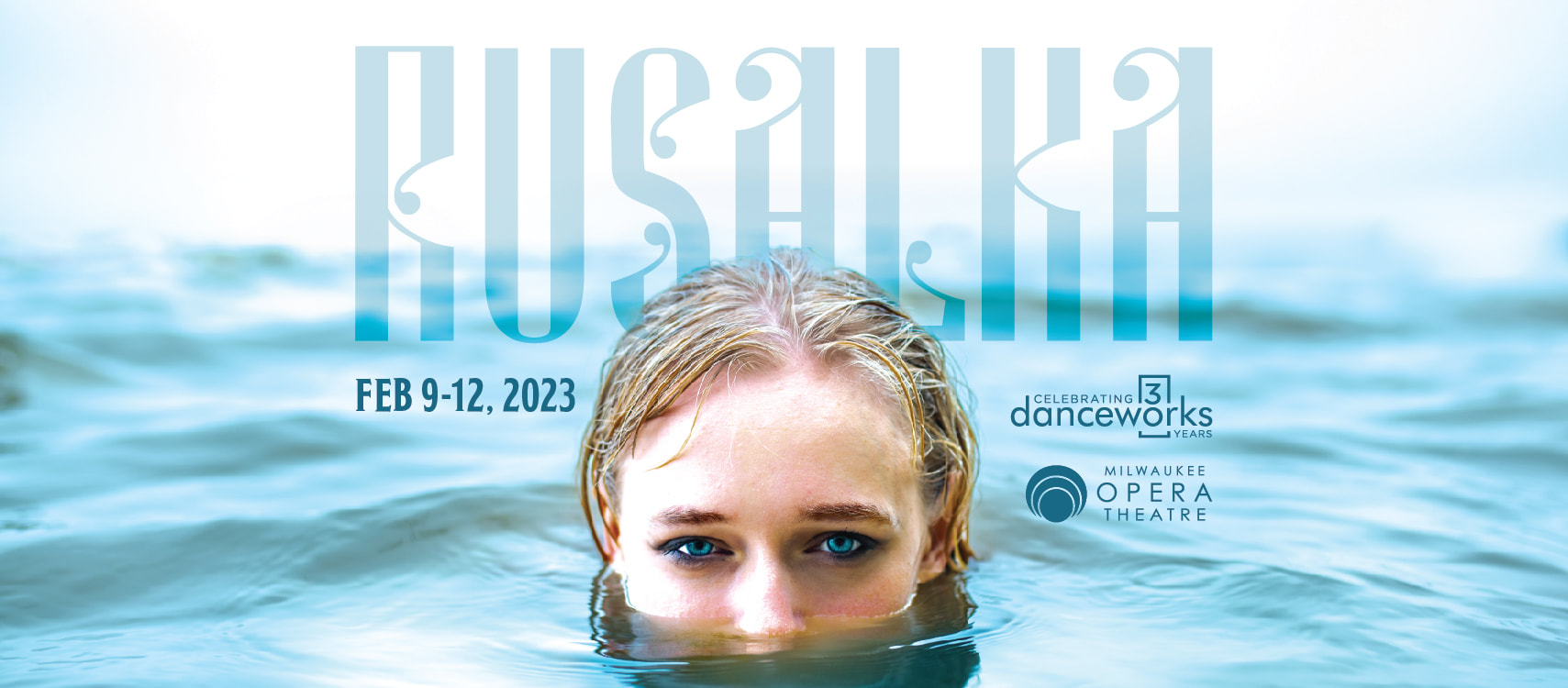A Charming and Beautiful Fairytale
by Paul Kosidowski
It’s a classic Milwaukee Opera Theatre project. Take a much beloved, “grand” opera, pare its nearly 3-hour length down to a manageable 75 minutes, make the story accessible to English-speaking audiences who aren’t interested in reading subtitles, and stage it in an intimate space so the music, action and emotions can be experienced without opera-glasses.
And don’t do it alone: find a similarly inventive, local arts group to collaborate with. Antonín Dvořák's Rusalka, a joint effort between MOT and Danceworks Performance MKE, is just such a project. It will be presented at Danceworks Studio Theatre, 1661 N. Water St., from February 9-12.
Dvořák’s 1901 opera is based on a story from Slavic folklore. It features a variety of otherworldly creatures—some singing, some dancing--including the title character, a water nymph who falls in love with a human prince. If that sounds a lot like The Little Mermaid, you’re on the right track.
To bring the story to modern audiences, MOT turned to its frequent collaborator, Jason Powell, known for original works like Fortuna the Time Bender vs. The Schoolgirls of Doom, and adaptations like Temptation’s Snare (a staged version of Igor Stravinsky’s A Soldier’s Tale).
The original Rusalka is “through-sung”—there is no spoken dialogue—which presented a challenge. The creators wanted to tell the story with a mixture of spoken dialogue and Dvořák’s original music.
“The story is pretty straightforward,” Powell says, “but the part that was tricky was deciding what should be sung and what should be spoken.” The collaborators—Powell, choreographer Christal Wagner, music director Ruben Piirainen, and stage director Jill Anna Ponasik—eventually put together a piece of music theater in which the major arias are sung (in the original Czech), and the story is told in spoken rhyming couplets.
Singing in the opera’s original language is important to preserve the beauty of Dvořák’s writing, of course. And Piirainen says there is no translation needed. “Typical of most opera,” he says, “there’s no action during the arias. It’s just a time for the character to reflect on what’s happened or about to happen. We can rely on Jason’s dialogue to fill people in.”
A more daunting task was finding the musical through-line for the story, Piirainen started with the piano version of the score and added a harp, which plays a prominent part in the orchestral score (played here by Erin Brooker-Miller). He then had to arrange the score so the music connected with the new spoken dialogue.
“Dvořák uses leitmotif’s a lot, like Richard Wagner,” Piirainen explained. “In the full score, Dvořák would introduce a musical theme underneath the dialogue that relates to what they are talking about. Even with spoken dialogue, I really wanted to preserve that use of leitmotifs. All the music is Dvořák’s, but I had to make some creative cuts to keep the right musical themes in line with the dialogue.”
The result is a charming and beautiful fairy tale that should bring some needed warmth to a Milwaukee February.
To order tickets, visit danceworksmke.org/purchase-tickets/.
And don’t do it alone: find a similarly inventive, local arts group to collaborate with. Antonín Dvořák's Rusalka, a joint effort between MOT and Danceworks Performance MKE, is just such a project. It will be presented at Danceworks Studio Theatre, 1661 N. Water St., from February 9-12.
Dvořák’s 1901 opera is based on a story from Slavic folklore. It features a variety of otherworldly creatures—some singing, some dancing--including the title character, a water nymph who falls in love with a human prince. If that sounds a lot like The Little Mermaid, you’re on the right track.
To bring the story to modern audiences, MOT turned to its frequent collaborator, Jason Powell, known for original works like Fortuna the Time Bender vs. The Schoolgirls of Doom, and adaptations like Temptation’s Snare (a staged version of Igor Stravinsky’s A Soldier’s Tale).
The original Rusalka is “through-sung”—there is no spoken dialogue—which presented a challenge. The creators wanted to tell the story with a mixture of spoken dialogue and Dvořák’s original music.
“The story is pretty straightforward,” Powell says, “but the part that was tricky was deciding what should be sung and what should be spoken.” The collaborators—Powell, choreographer Christal Wagner, music director Ruben Piirainen, and stage director Jill Anna Ponasik—eventually put together a piece of music theater in which the major arias are sung (in the original Czech), and the story is told in spoken rhyming couplets.
Singing in the opera’s original language is important to preserve the beauty of Dvořák’s writing, of course. And Piirainen says there is no translation needed. “Typical of most opera,” he says, “there’s no action during the arias. It’s just a time for the character to reflect on what’s happened or about to happen. We can rely on Jason’s dialogue to fill people in.”
A more daunting task was finding the musical through-line for the story, Piirainen started with the piano version of the score and added a harp, which plays a prominent part in the orchestral score (played here by Erin Brooker-Miller). He then had to arrange the score so the music connected with the new spoken dialogue.
“Dvořák uses leitmotif’s a lot, like Richard Wagner,” Piirainen explained. “In the full score, Dvořák would introduce a musical theme underneath the dialogue that relates to what they are talking about. Even with spoken dialogue, I really wanted to preserve that use of leitmotifs. All the music is Dvořák’s, but I had to make some creative cuts to keep the right musical themes in line with the dialogue.”
The result is a charming and beautiful fairy tale that should bring some needed warmth to a Milwaukee February.
To order tickets, visit danceworksmke.org/purchase-tickets/.
Paul Kosidowski is a freelance writer and a member of the Milwaukee Opera Theatre Board of Directors.


